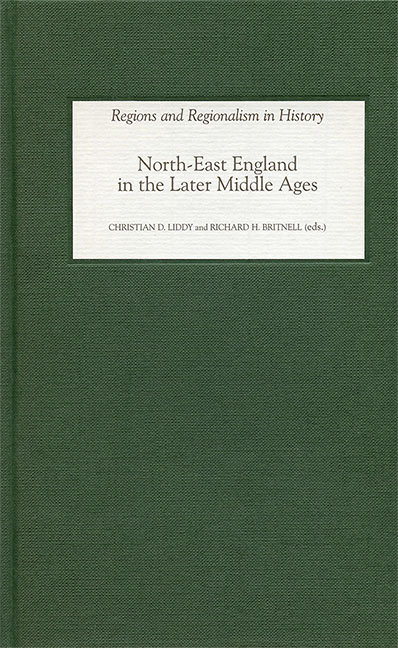Book contents
- Frontmatter
- Contents
- List of Illustrations
- Contributors
- Preface
- Abbreviations
- Introduction
- 1 St Cuthbert and the Border, c.1080–c.1300
- 2 John Hardyng, Northumbrian Identity and the Scots
- 3 Remembering the Legal Past: Anglo-Scottish Border Law and Practice in the Later Middle Ages
- 4 Scaling the Ladder: The Rise and Rise of the Grays of Heaton, c.1296–c.1415
- 5 Land, Legend and Gentility in the Palatinate of Durham: The Pollards of Pollard Hall
- 6 Local Law Courts in Late Medieval Durham
- 7 The Free Court of the Priors of Durham
- 8 Church Discipline in Late Medieval Durham City: The Prior as Archdeacon
- 9 Economy and Society in North-Eastern Market Towns: Darlington and Northallerton in the Later Middle Ages
- 10 Newcastle Trade and Durham Priory, 1460–1520
- 11 The Size and Shape of Durham’s Monastic Community, 1274–1539
- 12 Peasants, Landlords and Production between the Tyne and the Tees, 1349–1450
- 13 Wastes, the Margins and the Abandonment of Land: The Bishop of Durham’s Estate, 1350–1480
- 14 Framing Medieval Landscapes: Region and Place in County Durham
- Index
10 - Newcastle Trade and Durham Priory, 1460–1520
Published online by Cambridge University Press: 23 March 2023
- Frontmatter
- Contents
- List of Illustrations
- Contributors
- Preface
- Abbreviations
- Introduction
- 1 St Cuthbert and the Border, c.1080–c.1300
- 2 John Hardyng, Northumbrian Identity and the Scots
- 3 Remembering the Legal Past: Anglo-Scottish Border Law and Practice in the Later Middle Ages
- 4 Scaling the Ladder: The Rise and Rise of the Grays of Heaton, c.1296–c.1415
- 5 Land, Legend and Gentility in the Palatinate of Durham: The Pollards of Pollard Hall
- 6 Local Law Courts in Late Medieval Durham
- 7 The Free Court of the Priors of Durham
- 8 Church Discipline in Late Medieval Durham City: The Prior as Archdeacon
- 9 Economy and Society in North-Eastern Market Towns: Darlington and Northallerton in the Later Middle Ages
- 10 Newcastle Trade and Durham Priory, 1460–1520
- 11 The Size and Shape of Durham’s Monastic Community, 1274–1539
- 12 Peasants, Landlords and Production between the Tyne and the Tees, 1349–1450
- 13 Wastes, the Margins and the Abandonment of Land: The Bishop of Durham’s Estate, 1350–1480
- 14 Framing Medieval Landscapes: Region and Place in County Durham
- Index
Summary
This essay uses the expenditure recorded in the Durham Priory obedientiary accounts to shed some light on regional trade in the north east in the late medieval period. Using the accounts of a substantial local consumer to investigate the extent and structure of trade in the area of Durham and Newcastle-upon-Tyne provides a fresh perspective on these issues. The evidence available for the history of medieval Newcastle in particular is notoriously limited, with only a handful of municipal records having survived from before the sixteenth century. Despite this limitation, a substantial body of work has been built up by the resourceful use of what does remain, such as customs accounts. The official nature of the surviving evidence, however, has meant that little is known about Newcastle's trade from the consumers’ point of view, and so it has not been possible to quantify the relative importance of Newcastle as a supply centre to local purchasers. The wide range of purchasing information from a substantial series of years which is detailed in the Durham obedientiary accounts can go some way towards redressing this balance, giving valuable insights into the range and extent of trading activity both in Newcastle itself and throughout the north-east region.
In this essay it is argued that the evidence from Durham Priory indicates Newcastle's considerable importance as a centre for trade and distribution in the late medieval period, and moreover that this importance increased over the course of the fifteenth and early sixteenth centuries. In addition, the priory's relationship with, and use of, the marketplace as a source of supply will be considered. The priory acquired goods in two main and distinctive ways, either via tenurial links or via market purchasing. Here the priory's use of these two methods of acquisition is briefly outlined, and its use of the market is then discussed in more detail. The analysis will clarify which markets supplied the priory, the priory's use of agents in the purchasing process and the impact or otherwise of transport considerations on purchasing decisions.
- Type
- Chapter
- Information
- North-East England in the Later Middle Ages , pp. 141 - 152Publisher: Boydell & BrewerPrint publication year: 2005

